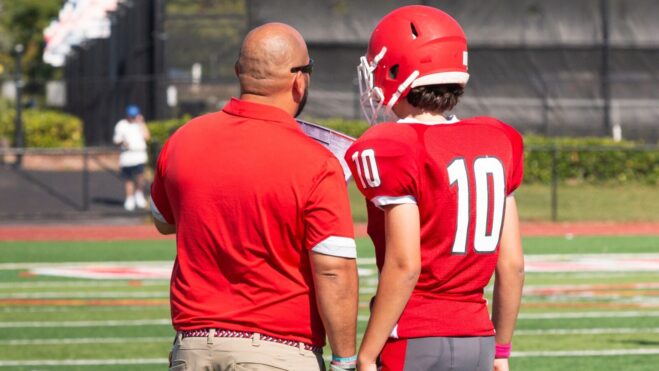Why Florida’s Problem Gambling Helpline Gets Zero Funding From The State
The tiny staff is left stretched awfully thin trying to keep its 24/7 services going
3 min

Last month, the Florida Council on Compulsive Gambling — the state’s problem gambling helpline — received 8,651 contacts. That includes phone calls, emails, live website chats, and text messages.
The FCCG staff size, meanwhile?
Seven.
And its helpline is open 24 hours, seven days a week.
So that means, if we’re divvying up contacts among the seven staff members, each was responsible for handling about 1,235 contacts over 31 days — so roughly 40 per day, weekday and weekend — in addition to other day-to-day duties, such as running responsible gambling training sessions and new hire orientations at the state’s eight racinos.
And all of this is currently happening with zero state funding from the Florida Gaming Control Commission. That relationship ended eight months ago.
“We were shocked,” Jennifer Kruse, the FCCG’s executive director, told Casino Reports. “We’re doing the best that we can. And we are still answering the calls. We’re exhausted.”
The FCCG (888-ADMIT-IT) is now fully funded by the Seminole Tribe of Florida, which pays the problem gambling helpline $1.5 million per fiscal year.
“If it wasn’t for the Seminoles,” Kruse said, “our doors would be closed.”
Eight months later, the commission still hasn’t announced a new helpline vendor.
So, what happened here? And what is happening here? Why isn’t Florida’s only problem gambling helpline receiving state funding? Why are the Seminoles footing the bill? And what comes next?
Two sides to one similar story
Here’s what the FGCC told Casino Reports about why it stopped funding the helpline:
“For many years, the Florida Gaming Control Commission and the Florida Council on Compulsive Gambling had a contractual relationship. At the end of the latest term of its contract with the Commission, the Council declined the Commission’s offer to renew the contract,” a spokesperson wrote in an emailed statement.
Kruse said that statement doesn’t give full context, though. She said they told the FGCC they would gladly accept the contract renewal if the commission agreed to modify the reporting requirements — which Kruse believed were unnecessarily extensive and bordering on impossible, given her small staff size.
She said she needed 30 employees, not seven, to meet the demand.
“And they didn’t want to [change the reporting requirements],” Kruse explained. “So it wasn’t just we told them, ‘No, we don’t want to work with you anymore.’ It’s definitely not the case and we would love a path forward to go back to being able to work with them and to provide these important resources.”
‘It’s not that we’re opposed to reporting’
Kruse sent Casino Reports an example of one of the monthly reports (March 2024) the helpline was required to send to the state gaming commission.
It contained 398 pages and 19 spreadsheets. There were:
- PDFs with stats for their newsletter emails
- Inventory information on A Chance for Change workbooks
- Brochure distribution figures
- Billboard advertising schedule
- Website traffic details
- Training module details for new hire orientations at racinos
- Site promotion numbers
- Vendor payments
- Expenses
- Payroll info
- Monthly account services
- A 288-page narrative summarizing everything that happened that month
“It’s not that we’re opposed to reporting,” Kruse said. “Obviously there has to be accountability measures — we’re not opposed to that. We totally get that. But the level of detail and the amount of man hours … was crippling us, really.”
Kruse said the legalization of online sports betting in December 2023 exponentially increased the helpline’s workload — and, thus, level of reporting — but the funding remained the same as when they signed the contract with the FGCC in 2019.
For perspective: Kruse said the helpline received 13,921 contacts in 2019; in 2024, it received 62,753.
“Something has to give,” Kruse said. “I mean, we can’t continue the same way when overnight we’ve just exploded in growth.”
Kruse said she works with problem gambling experts in other states on a consulting basis. She said they “have never seen anything to equal what the state of Florida has” in terms of reporting requirements.
Casino Reports directly asked the FGCC what its reporting requirements were. It did not respond to that question in its statement.
Voluntary funding from the Seminole Tribe
Gary Bitner, a spokesperson for the Seminole Tribe of Florida, told Casino Reports the tribe has had a relationship with the Florida Council on Compulsive Gambling for more than two decades. That relationship is discussed extensively in the tribe’s current gaming compact with the state.
“Support has included a significant voluntary cash contribution, plus widespread use of the 888-ADMIT-IT telephone number on marketing materials,” Bitner wrote via email. “The current annual contribution for each of the six casinos operated by Seminole Gaming in Florida is $250,000, or $1.5 million total per year.”
Kruse said the Seminole Tribe continued to pay $1.5 million annually to the helpline even when its revenue sharing deal with Florida was suspended in 2019-21.
What’s next for the commission and helpline?
The gaming commission told Casino Reports that “immediately after the expiration of the contract, the Commission initiated a competitive solicitation for services related to the prevention of compulsive and addictive gambling. Most recently, the Commission posted an Invitation to Negotiate, which is ongoing.”
Meanwhile, the FCCG is still open 24/7, funded by the Seminoles, taking calls, texts, emails, and live chats. No state funding for the past eight months doesn’t mean the state has removed 888-ADMIT-IT from the back of all state lottery tickets, or from every racino in the state.
Kruse and her team are still performing new hire orientations and training sessions at these facilities, too.
“I’m not really sure what the gaming control commission is doing about that because they don’t have a vendor in place and these things (new hire orientations) are required for [a racino] slot license,” Kruse said. “It’s not like, ‘Oh, well. We stopped the funding and we pulled the plug and you’re not going to get any more contacts.’”
In other words: Problem gambling issues don’t stop just because state funding does.






